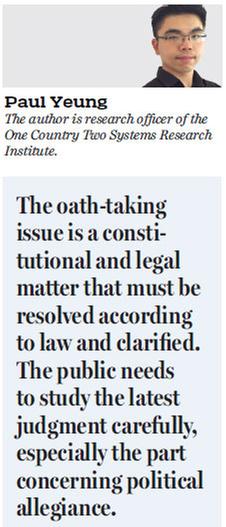True political implications of disqualification saga

Paul Yeung says the lawmakers' axing was a legal, not political, issue; its outcome will be an end to theatrics upon swearing-in
No one can beat the rap if he/she violates any law in Hong Kong, a society that treasures the principle of rule of law. The disqualification of four legislators was undoubtedly a legal issue that would eventually be settled by the court. However, some politicians are trying to portray this as a political issue and promoting speculations about the "political motive" behind the disqualification.
It is because of this logic that the opposition camp has taken some political moves. For example, some members of the opposition camp have floated the weird idea of a "trade-off": The new administration, led by Chief Executive Carrie Lam Cheng Yuet-ngor, would compromise on the disqualification issue in exchange for their consent to improve ties with the administration. After an internal meeting of the opposition camp, James To Kun-sun even said: "If the government is not determined to untie the knots, there is no way for the pan-democrats to maintain a normal relationship with the government, and no way for (the Legislative Council) to run like the business as usual." This kind of "trade off" obviously works against the principle of rule of law, one of Hong Kong's core values the opposition camp is fond of mentioning. Besides shooting themselves in the foot, the opposition legislators even hijacked the education funding proposal in the final meeting of the Finance Committee last Wednesday and left most of the other funding requests, including pay rises for 170,000 civil servants and public works programs, in the queue for the next LegCo session in October.

A legal issue has been highly politicized by the opposition camp, with the rule of law being threatened. We can expect that those who try to politicize this issue will face political consequence in the coming elections.
The political actions of the opposition camp were driven by misguided logic and were intended to conceal the true political implication of the disqualification controversy. If we look into the background of the disqualification, it is not hard to realize that it is not an issue of political freedom, but an issue of political allegiance. According to the Basic Law, the Hong Kong Special Administrative Region is an inalienable part of China. As part of the SAR's governance structure, all members of LegCo must abide by this fundamental principle. Therefore, the Basic Law provision on oath-taking in Article 104 was intended to emphasize China's sovereignty over Hong Kong.
"High degree of autonomy" and "Hong Kong people administering Hong Kong" are essential to the successful practice of the "one country, two systems" since Hong Kong's return to China. There is an underlying principle: The Hong Kong people who administer Hong Kong must be "patriots", according to late leader Deng Xiaoping's design. The interpretation of Article 104, which applies to oath-taking by public officers including principal officials, lawmakers and judges, states that upholding the Basic Law and pledging allegiance to Hong Kong as part of China are the legal requirements for running for and taking up public office. In political reality, this is also a touchstone for "patriots". That's why the National People's Congress Standing Committee had to provide a clear criterion, stating "an oath-taker must take the oath sincerely and solemnly, and must accurately, completely and solemnly read out the oath prescribed by law". According to the recent High Court judgment, the amended oath of the legislators-elect in question revealed they did not believe in the oath.
The oath-taking issue is a constitutional and legal matter that must be resolved according to law and clarified. The public needs to study the latest judgment carefully, especially the part concerning political allegiance. The opposition camp, including the disqualified legislators-elect, is planning to participate in the by-election. The High Court's disqualification ruling reminds the aspirants: They must take the oath sincerely and solemnly and admit their accountability to the country. Just as Albert Chen Hung-yee, a member of the Basic Law Committee, said: "After six lawmakers have been disqualified, people now know well what to do when they take the oath I don't think there will be anyone up to antics anymore during oath-taking, unless he or she does not want to become a lawmaker." This is the most significant and true political implication of the disqualification saga.
(HK Edition 07/26/2017 page8)
Today's Top News
- SOEs post stable revenue, profits in Jan-Nov
- First brew in Lhasa
- PLA fully capable of crushing secessionist attempts
- China holds central rural work conference
- President Xi to deliver New Year's message to ring in 2026
- Xi's diplomacy in 2025: Shedding light on a world at crossroads






























